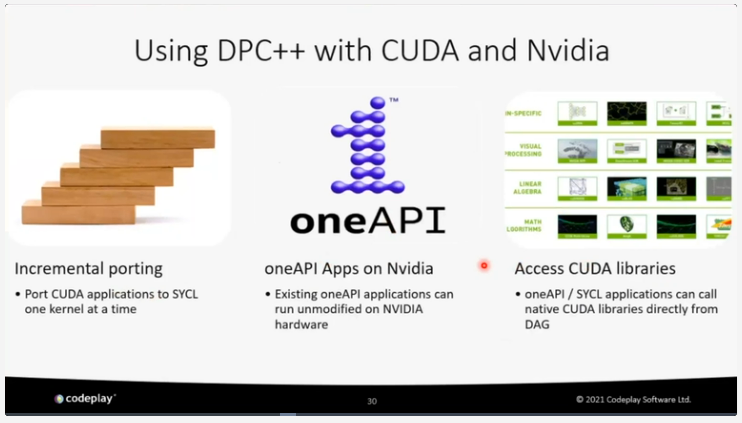Researchers Migrating to SYCL at SC21
29 November 2021
The SuperComputing SC21 conference is over, and I've been eager to see all the SYCL papers and presentations published on various topics. I wrote about all the SYCL activities at SC21 in my previous blog post and now I want to pick out some of the highlights.
The first day of the conference involved many concurrent sessions with around 16 different workshops, as well as a full day of content at the oneAPI Developer Summit.
The oneAPI Developer Summit focused largely on developers using SYCL with a range of sessions from tutorials and technical presentations to the closing panel session and this year there. This time there was a real focus on migrating code from CUDA to SYCL and the work that Codeplay has been doing to bring Nvidia GPU support to oneAPI is crucial for this.
Early in the day there was an hour long session by Codeplay engineer Joe Todd who explained how easy it is to migrate from CUDA to SYCL while still targeting Nvidia GPUs with great performance. The session included a code along section which you can watch back to understand how to set up your own environment with oneAPI for CUDA. This session is a great way to get a kick start your development journey from CUDA to SYCL.

To complement this, Eric Nielson from NASA with Mohammed Zubair from Old Dominion University presented their experiences of porting jet propulsion simulation code using CUDA optimized kernels to SYCL. Eric’s presentation highlights crucial details of how to migrate this type of code to target Intel GPUs using SYCL, covering topics including memory access patterns and optimization techniques.
Ravil Dorozhinskii from the Technical University of Munich talked about the experience of shifting their mindset from CPU programming to GPU programming. They also shared their experiences of using oneAPI for CUDA for earthquake simulation, with some promising performance results.
All the sessions are now available on demand.
Apart from the oneAPI Developer Summit on the first day there were numerous workshops worth keeping an eye on.
Tom Deakin from the University of Bristol regularly presents on performance portability and has written multiple papers over the years sharing results comparing models including OpenCL, SYCL and OpenMP. This year at SC21 during the HiPar workshop he explained ideas for expanding Hierarchical Parallelism in SYCL and showed benchmark results using these experimental techniques. This could be an interesting addition to the SYCL standard in the future for more effective use of parallelism.
At WACCPD Vincent Pascuzzi also presented his research in accelerating simulations as part of his research using data from the Large Hadron Collider which is fascinating and demonstrated that performance portability across processor architectures is very possible.
The last thing I will mention is the SYCL Birds of a Feather which had a large and interactive audience of both online and in person participants with some excellent debates and questions on a range of topics. If you registered for SC21 and missed it, you should definitely watch the recording through the event website.
We move on to Christmas and then 2022 when we expect to be talking about lots of activities at conferences and workshops throughout the year. Let us know what events you will be watching out for next year on the usual channels.
